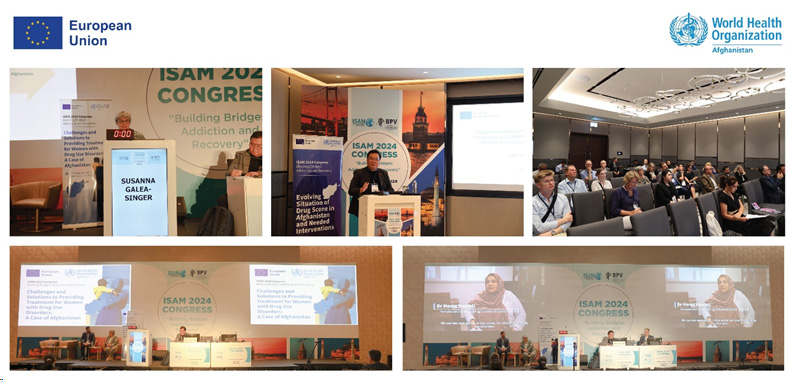 18 September 2024 — WHO Afghanistan, in partnership with the European Union (EU), took part in the 26th World Congress of the International Society of Addiction Medicine (ISAM). The Congress was held in Istanbul, Türkiye between 5–8 September 2024. Under the theme Building Bridges: Addiction and Recovery, it provided a platform for WHO Afghanistan to highlight changes in the drug scene in Afghanistan and the interventions needed to address drug use disorders and mental health challenges in the country.
18 September 2024 — WHO Afghanistan, in partnership with the European Union (EU), took part in the 26th World Congress of the International Society of Addiction Medicine (ISAM). The Congress was held in Istanbul, Türkiye between 5–8 September 2024. Under the theme Building Bridges: Addiction and Recovery, it provided a platform for WHO Afghanistan to highlight changes in the drug scene in Afghanistan and the interventions needed to address drug use disorders and mental health challenges in the country.
The symposium ‘Evolving situation of the drug scene in Afghanistan and needed interventions’ on 5 September addressed the effects of the 2022 ban on opium cultivation. The ban cut opium production by 95% in 2023, leading to higher prices and a shift to more dangerous drugs like methamphetamine. WHO experts highlighted the urgent need for harm reduction programmes and community services to combat the increasing risks of overdose and diseases like HIV and Hepatitis C.
The 7 September symposium ‘Challenges and solutions to providing treatment for women with drug use disorders: a case of Afghanistan’ focused on the difficulties faced by Afghan women dealing with drug use disorders in a context marked by gender inequality and stigma.
With over 850 000 women reported to be using drugs in Afghanistan, speakers highlighted the need for gender-specific, trauma-informed treatment programmes, particularly for pregnant women, and stressed the importance of integrating mental health and psychosocial support into drug treatment services to prevent relapse and ensure long-term recovery.
A central theme of WHO Afghanistan’s presentations was the importance of partnership with the EU in tackling drug demand reduction and mental health crises. Karolina Lagiewka, Health Project Officer at the EU Delegation to Afghanistan, underscored the importance of this collaboration: "The partnership between WHO and the European Union plays a pivotal role in addressing Afghanistan's pressing drug demand reduction and mental health crises. Through coordinated efforts and evidence-based programmes, this collaboration has driven impactful outcomes that support the nation's recovery and sustainable development."
Dr Manuel De Lara, Public Health Officer at WHO Afghanistan and the lead on mental health and psychosocial support, drug demand reduction and noncommunicable diseases, reinforced the importance of these interventions: "To secure the future of Afghanistan, investing in mental health and psychosocial support remains critical. Strengthening connections between mental health and drug demand reduction activities is essential for long-term recovery."
Speaking at the second symposium, Dr Shayista Hakim, Supervisor of the Kabul 100-bed Women and Children Drug Addiction Treatment Centre (DATC), highlighted the importance of the centre’s work: “Running the Kabul 100-bed Women and Children DATC has been a journey of hope and transformation. Thanks to generous support from the EU, WHO and United Nations Office on Drugs and Crime, we are creating a much-needed sanctuary for women and children where they can treat substance abuse disorders and rebuild their lives.”
WHO Afghanistan, together with the EU, remains committed to supporting Afghanistan’s recovery by integrating mental health services with drug treatment and harm reduction programmes. The ISAM 2024 Congress offered a valuable opportunity to share experiences, forge new partnerships and address the ongoing challenges of addiction and mental health in Afghanistan.
Speakers:
Ms Karolina Lagiewka, Health Project Officer, EU Delegation to Afghanistan
Dr Ali Farhoudian, Associate Professor of Psychiatry, Tehran University of Medical Science
Dr Shayista Hakim, Kabul Female and Children DATC Supervisor
Dr Susanna Galea-Singer, Clinical Innovations Lead, NHS Fife, United Kingdom
Dr Manuel De Lara, Public Health Officer, WHO Afghanistan
Dr Alireza Noroozi, Technical Officer, WHO Afghanistan
Dr Basharat Hussain, Technical Officer, WHO Afghanistan
Dr Abdul Qudos Saadat, Technical Officer, WHO Afghanistan
Dr Bashir Ahmad Fazly, Technical Officer, WHO Afghanistan
For media inquiries, please contact:
Nourhan El-Nagdy
Communication Officer, WHO Afghanistan
Email:


